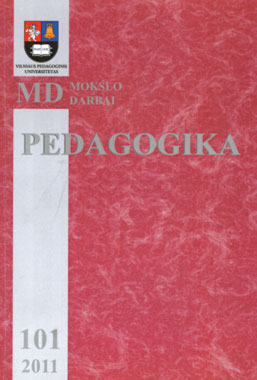Vaikų metaforinio mąstymo raiška kognityvinės raidos kontekste
The expression of children metaphoric thinking within cognitive development contex
Author(s): Daiva MalinauskienėSubject(s): Education
Published by: Vytauto Didžiojo Universitetas
Keywords: children; metaphorical thinking, cognitive development.
Summary/Abstract: Metaphoric thinking at preschool and primary school ages is rather an important issue that allows to find new scientific solutions while developing educational researches in Lithuania. At the moment much is done in European and US scientific institutes and research centers as these surveys make the basis for a deeper understanding of childhood’s educational features and helps to construct child’s education process. Metaphoric thinking based on Piaget and Vygotsky cognitive development theories is analyzed within this paper. Piaget stressed realistic child’s 13. 14. 15. cognitive development level and has described it as the system of abilities and skills, while Vygotsky has driven more attention towards potential child’s possibilities when education overcomes the cognitive development. Therefore the potential of tools to develop metaphoric thinking is revealed in this research when using Lithuanian riddles and sayings. During diagnostic and experimental researches the real understanding level of riddles is set and this is closely related to the level of cognitive development. 4th graders compared them with 2nd graders, have reached much higher level of interpreting riddles and sayings. The experiment has showed that 2nd graders after using those special tools of developing metaphorical thinking also have reached the level of 4th graders from control group, and this fact shows the potential of such teaching instruments. The duration of experiment was 7 months when algorithms for understanding riddles and Lithuanian traditional sayings were used in practice. The most obvious outcome – 2nd graders ontogenetic development jump that shows better abilities of those students to understand sayings, decode their meanings between lines, and interpret them. The results of the executed investigations enable us to state that proverbs can be a successful tool for the development of the metaphoric thinking of primary school children’s, applying the tasks, work methods, and ways corresponding to the concrete stage of cognitive development.
Journal: Pedagogika
- Issue Year: 2011
- Issue No: 101
- Page Range: 57-62
- Page Count: 6
- Language: Lithuanian

